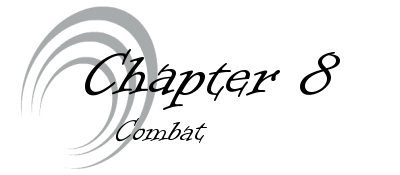Difference between revisions of "Journey Combat: Initiative"
GnomeWorks (Talk | contribs) (→Method: Highest Init Sets the Bar) |
GnomeWorks (Talk | contribs) (→Method: Highest Init Sets the Bar) |
||
| Line 30: | Line 30: | ||
Standard + (10 - SPD) + (WT / 2) | Standard + (10 - SPD) + (WT / 2) | ||
Move | Move | ||
| − | Movement + Squares Moved + WT / 4 | + | Movement + Squares Moved + (WT / 4) |
| − | Other + (8 - SPD) + WT / 4 | + | Other + (8 - SPD) + (WT / 4) |
Quick + 0 + 0 | Quick + 0 + 0 | ||
Revision as of 19:56, 19 March 2008
The initiative system in d20 is unrealistic. After the first round, your initiative no longer matters; you know that everyone will go once before you go again. This is problematic, and we should fix it.
Theory
There are a good deal of possible solutions to this problem, some of which are more sensical in a tabletop game than others. Attempting to implement "ticks," as in MMOs, will not serve as an acceptable solution, for instance.
The best solution, in my mind, is to use an ever-ascending scale. Each time you take an action, you add a number to your initiative; after the action, the person with the next lowest initiative goes, and so forth. This allows for those who are faster to go more often. It adds an element of unpredictability to the tactical game that is a melee, which is a benefit. It may also prove more realistic: someone who is faster, either by virtue of high Dex or high Initiative, should be able to do more in a combat than someone who is slow to react.
Implementation
How do we implement this? That's always the question. Now we have an idea; how do we go about making it sensical mechanically.
Including WT in the equation is easy enough. With the scale being an increasing one, you would simply add your total WT (or fractions thereof) to your init with each action, thereby increasing the time you have to wait to go again. This is simple and sensical, so long as the fractions are kept to a minimum. The fraction of WT added would be dependent upon the type of action you take, not the action itself.
With that in mind, we'll have to make the additions to init high enough to make WT something that will mess you up, but not something that will totally screw you over.
Perhaps the best solution would be to do the same thing here we did with experience points...
Method: Highest Init Sets the Bar
In this method, initiative is rolled by all combatants, as normal. Whoever rolled the highest goes in segment 0; everyone else subtracts their initiative roll from the highest, and goes in that segment.
Example: Jane and Bob are in a combat with three gobbos. Jane rolls a 17, Bob a 12, gobbo A a 3, gobbo B a 16, and gobbo C gets an 11. Jane has the highest, so she goes in 0; Bob goes in 5, A goes in 14, B goes in 1, and C goes in 6. So the initiative order is Jane, then B, then Bob, then C, then A.
TABLE: ATB COSTS and WT (v2.1) ATB WT ACTION COST ADD Full + (20 - SPD) + WT Partial + (10 - SPD) + (WT / 2) Standard + (10 - SPD) + (WT / 2) Move Movement + Squares Moved + (WT / 4) Other + (8 - SPD) + (WT / 4) Quick + 0 + 0 Instant + 2 + 0 Swift + 1 + 0 Free + 0 + 0 SPD: SPD is equal to your Dex mod plus any bonuses. Things like (haste) make your SPD increase.
Example: Jane, on her turn, moves to goblin A. A move action costs 10 segments plus a quarter of her WT (which is 8), so her init is now 12 (10 + (8 / 4) = 12). The init order is now B, Bob, C, Jane, A.
As an added benefit, spell effects would no longer be tied to the caster's rounds. The caster would say, "this spell lasts 40 segments." If the caster went in 24, that means that the spell would end in 64, regardless of who is going at that time.
